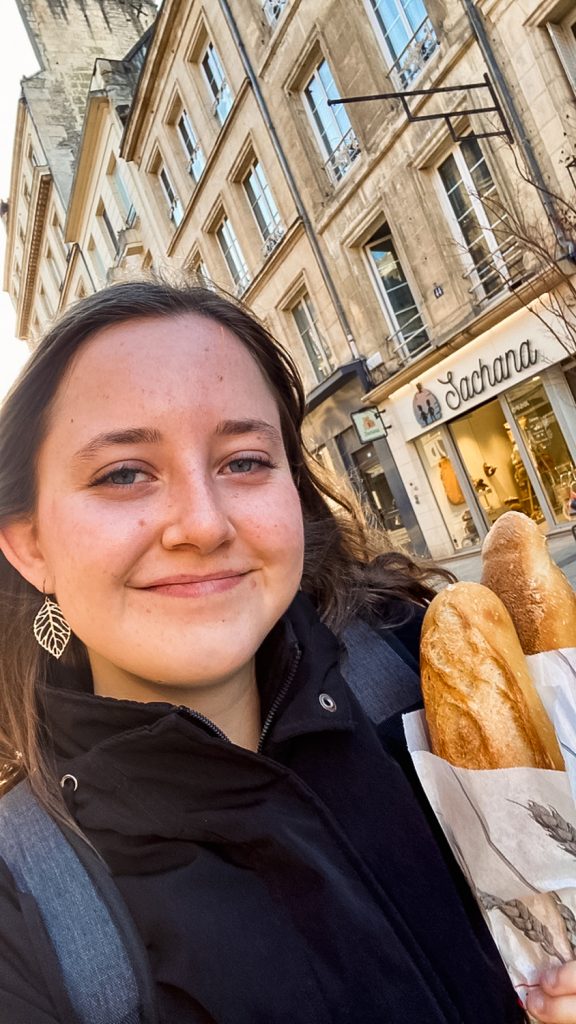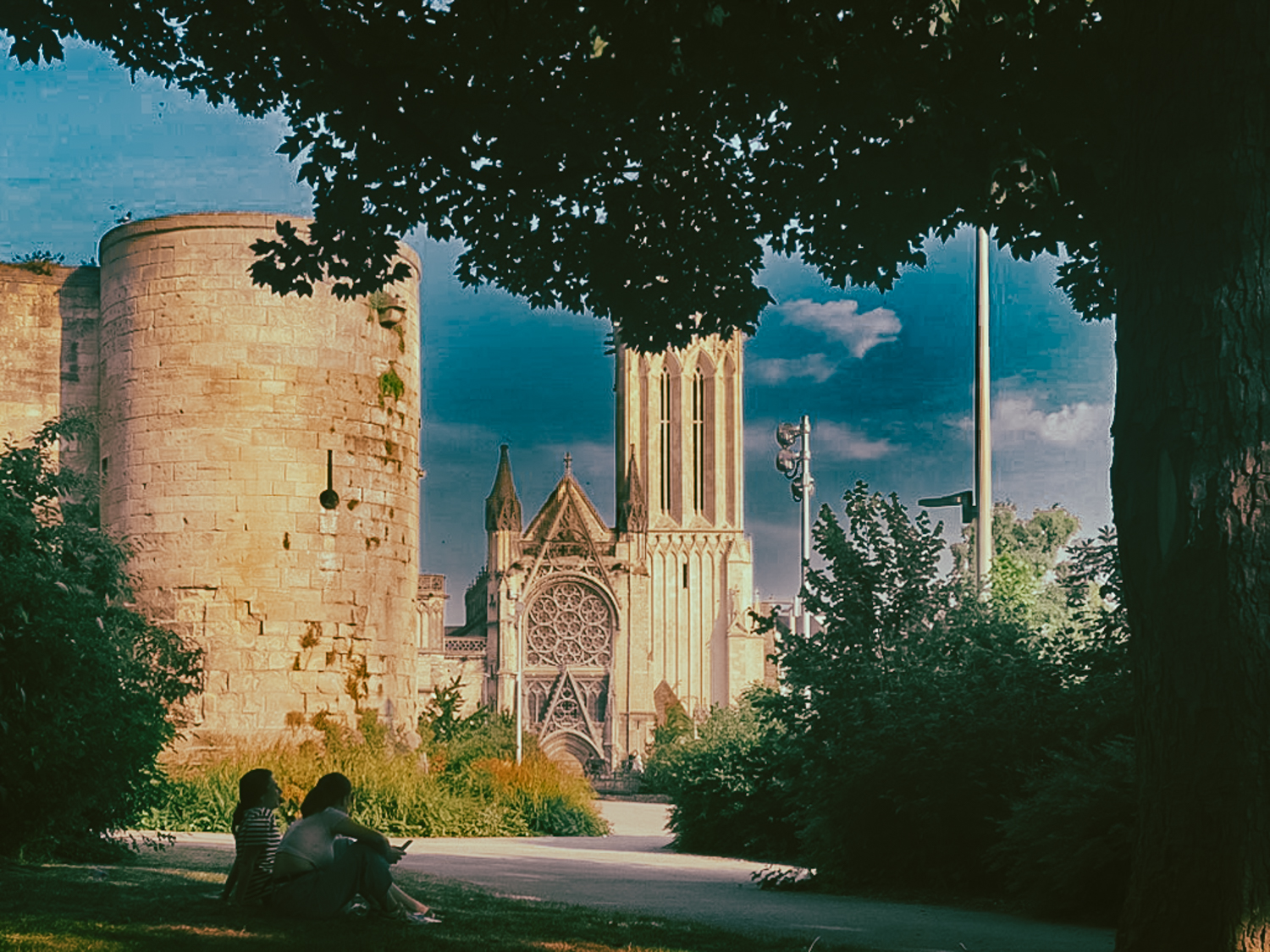ARTICLE & PHOTOS BY JAËL GUEST
I lean against the stone ledge, gazing out over the city as the embers of the setting sun heat the rooftops. Behind me, the château walls glow with orange light. The bells from the magnificent cathedral spire echo in my ears. Below, college students sprawl among the spring flowers sloping away from the château, giving way to bustling streets. Even from here, my ears catch the whispers of conversations and the chatter of distant shoppers and restaurant goers. Drinking in this image, I breathe out a profound sigh of contentment. A voice in my mind murmurs, How will you ever return after experiencing this life?
Standing atop an ancient castle at sunset, it is difficult to imagine that only a few hours later I might be curled in my bed, stricken and paralyzed while clutching my head in sheer, overwhelming anxiety.
My year as an exchange student in Caen, France, was a perplexing paradox. How is it possible to be happier than you’ve ever been and mentally unraveling at the same time? A phrase often used to promote study abroad is “self-discovery.” Indeed, this was a benefit I specifically hoped to gain from my experience. And I certainly did, though not in the way I expected.
In high school, a particular literary passage left an imprint on my mind. It was from an essay titled “Self-Reliance” by Ralph Waldo Emerson, in which he declared: “Traveling is a fool’s paradise. Our first journeys discover to us the indifference of places. At home I dream that at Naples, at Rome, I can be intoxicated with beauty, and lose my sadness. I pack my trunk, embrace my friends, embark on the sea, and at last wake up in Naples, and there beside me is the stern fact, the sad self, unrelenting, identical, that I fled from…my giant goes with me wherever I go.”
After reading these words by Emerson, I began a sort of self-talk whenever I became too eager to live abroad. “Life is still just life, no matter where you are,” I told myself. “Don’t be disappointed if it’s not everything you dreamed.”
Fast-forward to life in France, and my understanding of Emerson’s words shifted. Places may be indifferent to each individual, but the individual is not indifferent to places. The same place can feel like a square peg in a round hole for one person yet connect perfectly with a different soul like a key fits a lock. For my soul, France was that key.
Even as months passed, I would still feel a giddy rush standing on that ledge, watching the sun paint pastel hues over the rooftops of Caen. I would still grin like a child, glancing out the window of the tram as I passed the ancient churches. “I’m studying abroad in France!” I would whisper to myself when I walked to class or to the boulangerie. Moreover, nothing compared to the satisfaction of progress in a second language. Each new triumph, no matter how small, left me euphoric. My appetite for French only grew, to the point that I wept at the prospect of becoming once more marooned from the language that had captured my heart.
In brief, the joy that radiated through me during the everyday rhythm of life in France was honestly shocking to me. Where was the disillusionment that Emerson and others had assured me would come? When I first read Emerson’s words in tenth grade, I interpreted them to be a warning against romanticizing foreign places as perfect and beautiful compared with our “normal” life ridden with problems. In the same passage he proclaims, “I affect to be intoxicated with sights and suggestions but I am not intoxicated.” Yet here I was in France, “intoxicated” with a joy that did not seem to fade.
“Traveling is a fool’s paradise. Our first journeys discover to us the indifference of places. At home I dream that at Naples, at Rome, I can be intoxicated with beauty, and lose my sadness. I pack my trunk, embrace my friends, embark on the sea, and at last wake up in Naples, and there beside me is the stern fact, the sad self, unrelenting, identical, that I fled from…my giant goes with me wherever I go.”
RALPH WALDO EMERSON
Yet my ease and contentment with French life was only one side of the story. Long-term adjustment to a new life takes a deeper, more subtle toll on your adaptability than the initial culture shock. Thus, it wasn’t until a few weeks into the semester that I really began to notice the mental upheaval taking place inside me.
The first sign was when I started to doze off in class. For anyone who knows me, that is an absolute shock. I’ve always been an excellent student, I never missed class, and I always attacked each course with equal determination, regardless of whether it was related to my interests. Yet here I was, sleeping in class?!
Another novelty occurred around midterms. For the first time in my life, I had a panic attack during a test, and then during three other essay tests over the course of both semesters. The constant exhaustion continued, but despite my efforts, my anxiety kept me up until two or three in the morning.
Also, my ability to keep track of tasks deteriorated. Chores were forgotten, appointments never made it to my calendar, emails were left without replies. I felt like my brain was a sieve, details escaping through ever-widening cracks. Some days, these problems crescendoed into a sense of overwhelming futility. Terror would seep through my body like ice in my veins, leaving me either paralyzed and numb, or shattered in a full-blown breakdown.
My frustration reached a boiling point. I wasn’t about to let my own unraveling brain ruin the opportunity I had worked so hard to obtain. What was going on? The realization gradually dawned on me.
Yes, Emerson warned against holding a romantic image of places. But the heart of his conclusion was that you can’t expect a change in location to change who you are. “My giant goes with me wherever I go…” Now that I was in France, I began to ask myself: Had I fled from some part of myself by going abroad, hoping it would be healed by the “intoxicating” beauty of French life? What was my giant?
I’ve dealt with anxiety for as long as I can remember. I was a timid child, a follower, insecure in myself and uncertain in my decisions. However, I was highly aware of what I knew were irrational fears. As a result, I attempted to improve myself with intentional efforts. If something intimidated me, I pursued it until I faced my fear. Performing in front of others scared me, so I took dance classes for two years. Teaching and leadership responsibilities stressed me out, so I became a youth intern at my church.
In the same way I had tackled my fears in my childhood, I hoped that my travels would test and ultimately transform my anxiety for the better—sort of like throwing myself off the deep end and trying to swim. In reality, sending myself to another country for 10 months was like chucking myself off a cliff and hoping I would sprout wings while plummeting through the air.
But my wings never unfurled, and my heart sank as I realized my giant had followed me to France. All the coping mechanisms I’d previously used to beat down my anxiety collapsed. My giant was feeding on challenges beyond anything I’d ever faced—the overwhelming amount of change I had to adjust to, the mental exhaustion that comes with language immersion, and the innumerable and terrifying “firsts” I was figuring out on my own.
The problem with mental health is you cannot “muscle” your way out. Making lists, using timers, setting goals…I tried all the advice that worked for others, but I could not transform myself through pure willpower. Emerson’s words floated through my mind: “There beside me is the stern fact, the sad self, unrelenting, identical, that I fled from.”
I began to ask myself: Had I fled from some part of myself by going abroad, hoping it would be healed by the “intoxicating” beauty of French life?
Nevertheless, I also knew I had found where I belonged. Such a strange and bewildering paradox. My experiences in France were better than I ever dreamed. I fell more in love with the language and the country every day. By the second semester, I had a bigger friend group than I’d ever had. Furthermore, the infectious enthusiasm of one of my professors lit a fire in my heart for linguistics and even moved me with a desire to follow in his footsteps down the path of professorship. Despite my mental health struggles, I felt more fulfilled and inspired than ever before. I became more confident, independent, and better at problem-solving. I was less worried and more spontaneous. And I was more alight than ever with a passion for people, languages, and cultures.
After everything, it turned out my biggest challenge in Caen was the giant I brought with me. I think in the past I denied its existence, blaming my character for my difficulties and striving in vain for an ideal that I know now was dangerously extreme. When my giant swelled to new heights in France, I was finally forced to confront it.
When I look back on my year abroad, I have no regrets. I learned that I am capable of more than I ever imagined. While in France, I discovered my limits: which limits I can break, and which limits break me. I didn’t slay my giant, and I know it will follow me wherever I go next. But thanks to the challenges I faced, I confronted it, thus taking my first step towards healing. I had chased study abroad in pursuit of self-discovery. And I had truly found myself.



